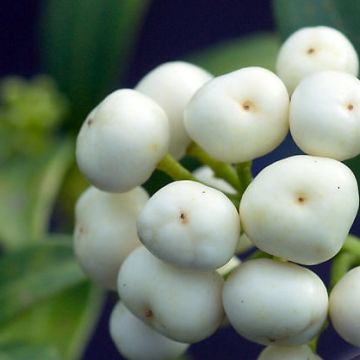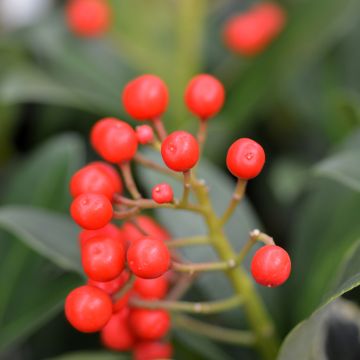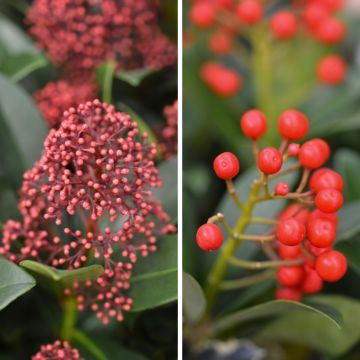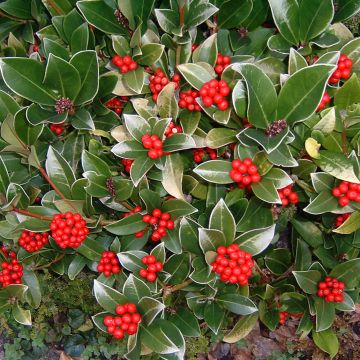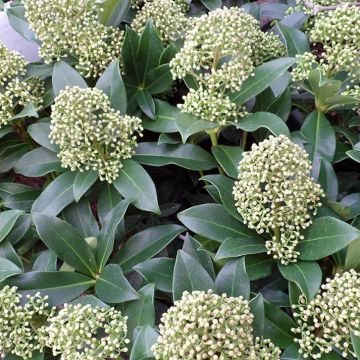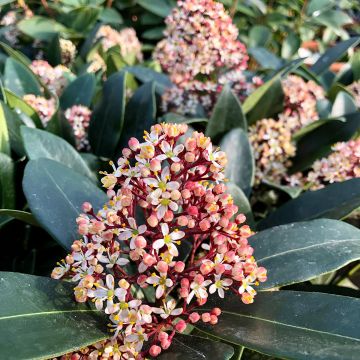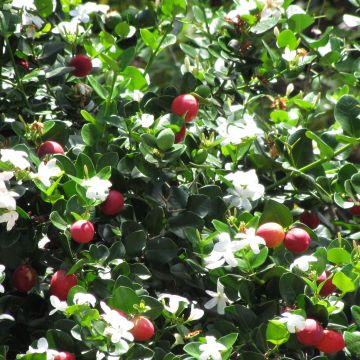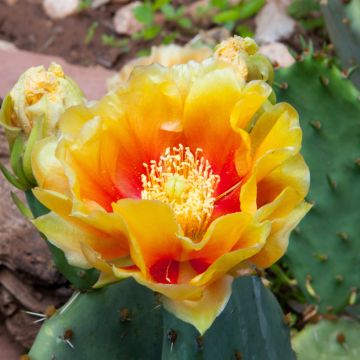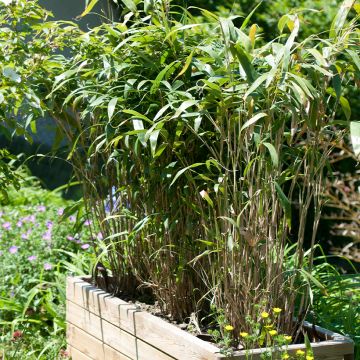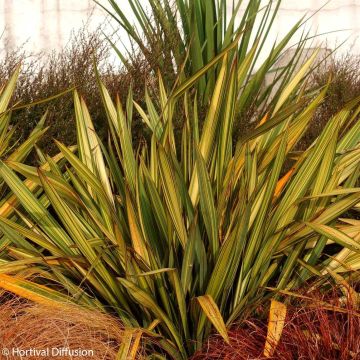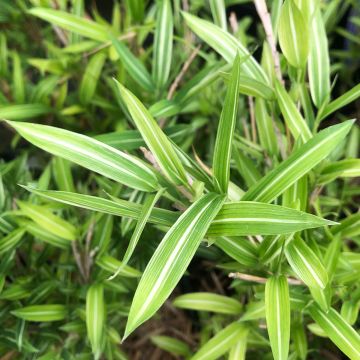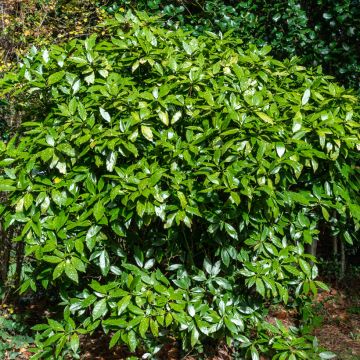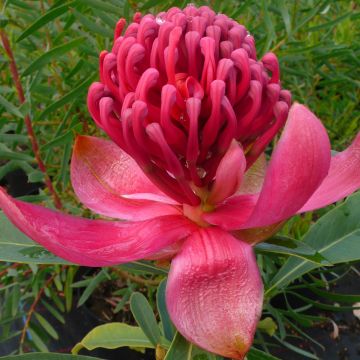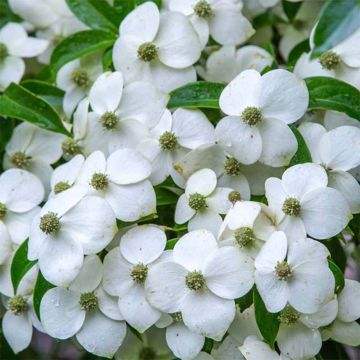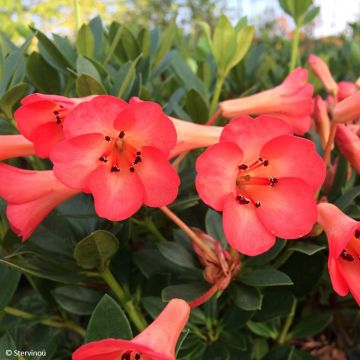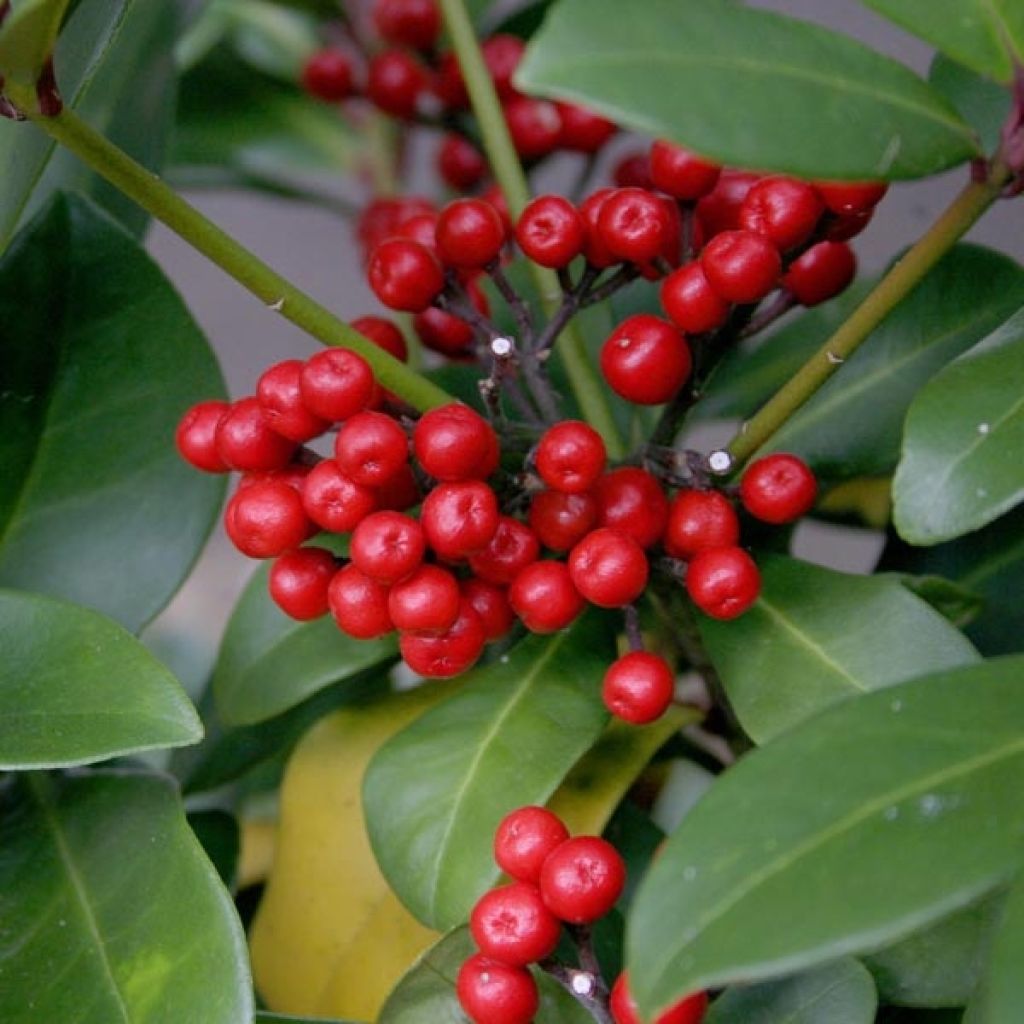

Skimmia japonica Veitchii
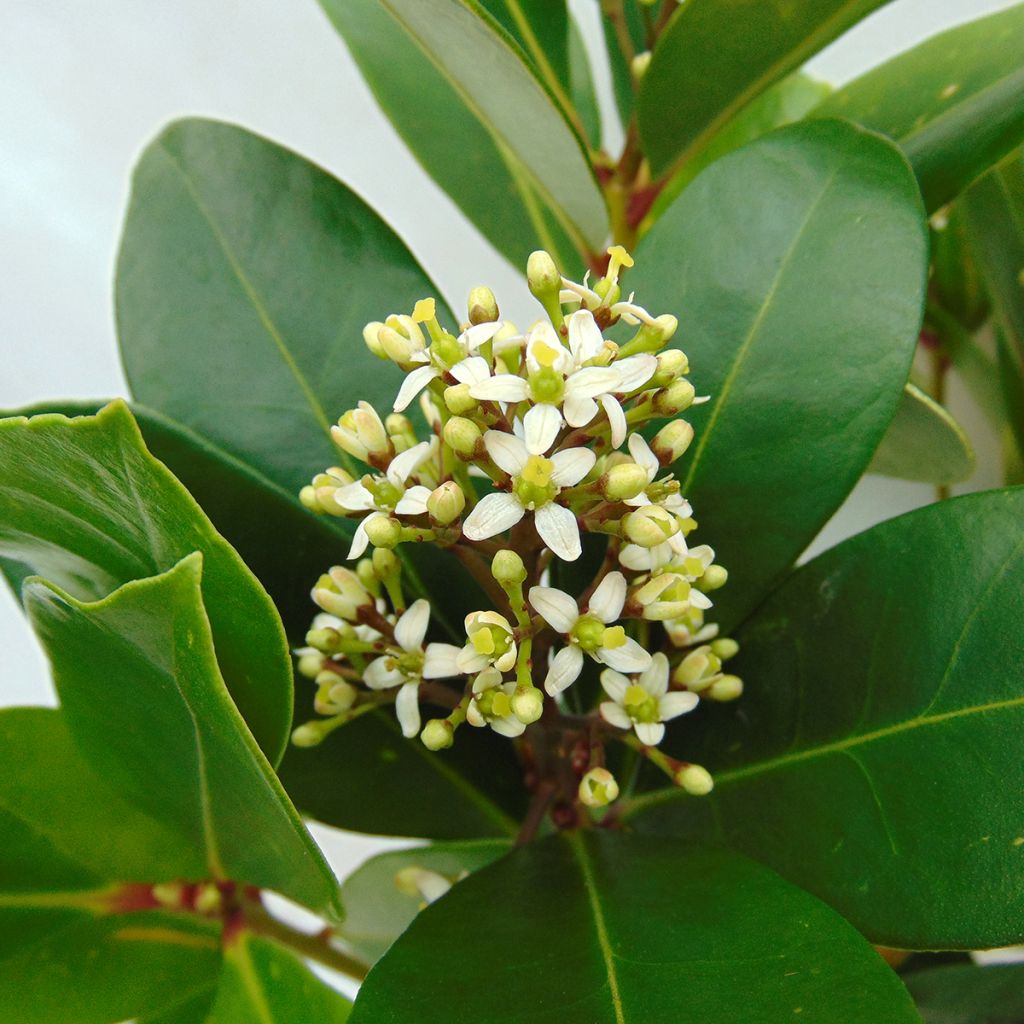

Skimmia japonica Veitchii
Skimmia japonica Veitchii
Skimmia japonica Veitchii
Japanese Skimmia
Why not try an alternative variety in stock?
View all →This plant carries a 24 months recovery warranty
More information
We guarantee the quality of our plants for a full growing cycle, and will replace at our expense any plant that fails to recover under normal climatic and planting conditions.
From €5.90 for pickup delivery and €6.90 for home delivery
Express home delivery from €8.90.

Does this plant fit my garden?
Set up your Plantfit profile →
Description
The Skimmia japonica 'Veitchii' is a variety of Japanese skimmia that remains decorative for most of the year: this small, sturdy bush offers beautiful evergreen foliage, a white and fragrant spring flowering, followed by striking red fruits that remain throughout the winter until March. With its elegant laurel-like appearance, it thrives in partially shaded areas of the garden or a large pot on the terrace. This plant has the exact cultivation requirements as camellias and rhododendrons, with which it pairs perfectly.
The Skimmia japonica 'Veitchii' is a female cultivar, which will bear fruit in the presence of a male cultivar such as 'Rubella'. Belonging to the Rutaceae family, like citrus trees, Skimmia japonica is originally an Asian plant found in Southeast Asia. 'Veitchii' has a bushy habit, beautifully rounded, compact, almost as wide as tall, and its growth is relatively slow. At maturity, the bush will reach approximately 1.50 m (5ft) in all directions. Floral buds form in autumn on the branches; they are pink-purple, carried by petioles of the same shade that remain throughout the winter.
In April-May, flowering appears in panicles 3 to 8 cm (1 to 3in) long. They consist of many tiny white star-shaped flowers measuring a few millimetres. Their fragrance, reminiscent of vanilla, can be detected several metres away. After pollination, small berries form and turn bright red in October, gathered in clusters. The evergreen foliage in winter is composed of oval-shaped, pointed leaves measuring 5 to 10 cm (2 to 4in) long. They are arranged alternately on the branches and have a shiny dark green colour. The foliage is slightly aromatic when crushed and not edible. This bush is also very hardy, at a minimum of -15°C.
In cool and humid climates, the Skimmia japonica Veitchii is in the undergrowth, along a north-facing facade, shrub bed, or shaded hedge. It does not appreciate chalky and/or dry soils and is sensitive to heat, but it can tolerate somewhat difficult conditions for vegetation, such as under bamboo or large trees. It thrives in shade or partial shade alongside camellias, rhododendrons, heathers, and hydrangeas. Plant cyclamen, bergenia, and eranthis at its base, for example. 'Veitchii' is suitable for cultivation in pots or containers for decorating shaded patios and balconies. It blends well in contemporary or Japanese-inspired settings.
Skimmia japonica Veitchii in pictures


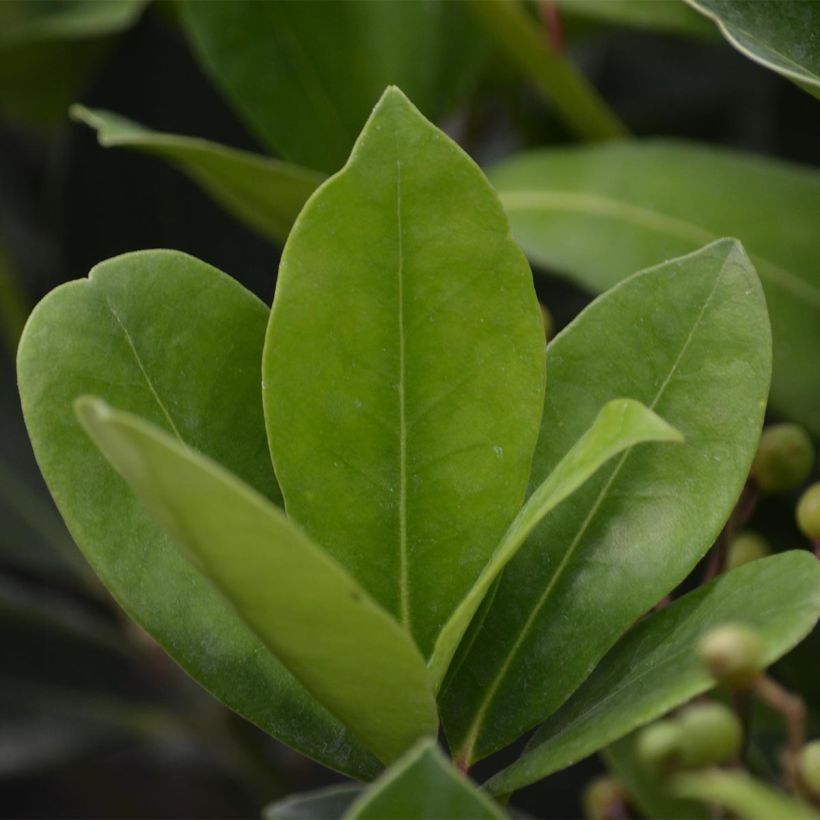

Plant habit
Flowering
Foliage
Botanical data
Skimmia
japonica
Veitchii
Rutaceae
Japanese Skimmia
Cultivar or hybrid
Other Skimmia
Planting and care
Skimmia japonica 'Veitchii' is a plant that can be grown in acidic or neutral soil. It should be planted in a sheltered spot to protect it from cold drafts. While it can tolerate ericaceous soil, it can also be grown in a pot. The plant prefers partial shade and should be watered regularly to avoid stress due to drought. It is not tolerant of limestone, so it is best to avoid using hard tap water for watering. Skimmia japonica 'Veitchii' grows slowly, and though pruning is not necessary, it can be done in the spring after flowering.
Planting period
Intended location
Care
Evergreen shrubs
Haven't found what you were looking for?
Hardiness is the lowest winter temperature a plant can endure without suffering serious damage or even dying. However, hardiness is affected by location (a sheltered area, such as a patio), protection (winter cover) and soil type (hardiness is improved by well-drained soil).

Photo Sharing Terms & Conditions
In order to encourage gardeners to interact and share their experiences, Promesse de fleurs offers various media enabling content to be uploaded onto its Site - in particular via the ‘Photo sharing’ module.
The User agrees to refrain from:
- Posting any content that is illegal, prejudicial, insulting, racist, inciteful to hatred, revisionist, contrary to public decency, that infringes on privacy or on the privacy rights of third parties, in particular the publicity rights of persons and goods, intellectual property rights, or the right to privacy.
- Submitting content on behalf of a third party;
- Impersonate the identity of a third party and/or publish any personal information about a third party;
In general, the User undertakes to refrain from any unethical behaviour.
All Content (in particular text, comments, files, images, photos, videos, creative works, etc.), which may be subject to property or intellectual property rights, image or other private rights, shall remain the property of the User, subject to the limited rights granted by the terms of the licence granted by Promesse de fleurs as stated below. Users are at liberty to publish or not to publish such Content on the Site, notably via the ‘Photo Sharing’ facility, and accept that this Content shall be made public and freely accessible, notably on the Internet.
Users further acknowledge, undertake to have ,and guarantee that they hold all necessary rights and permissions to publish such material on the Site, in particular with regard to the legislation in force pertaining to any privacy, property, intellectual property, image, or contractual rights, or rights of any other nature. By publishing such Content on the Site, Users acknowledge accepting full liability as publishers of the Content within the meaning of the law, and grant Promesse de fleurs, free of charge, an inclusive, worldwide licence for the said Content for the entire duration of its publication, including all reproduction, representation, up/downloading, displaying, performing, transmission, and storage rights.
Users also grant permission for their name to be linked to the Content and accept that this link may not always be made available.
By engaging in posting material, Users consent to their Content becoming automatically accessible on the Internet, in particular on other sites and/or blogs and/or web pages of the Promesse de fleurs site, including in particular social pages and the Promesse de fleurs catalogue.
Users may secure the removal of entrusted content free of charge by issuing a simple request via our contact form.


































